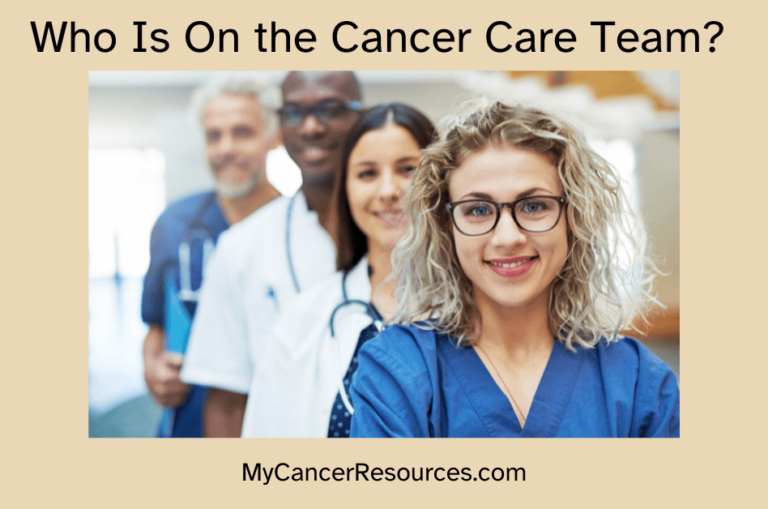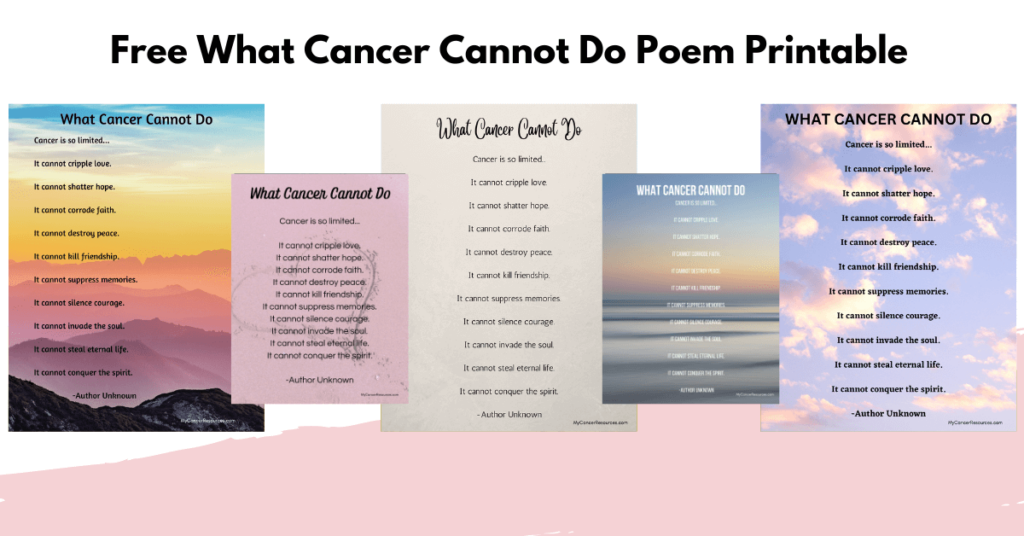
A cancer diagnosis changes your life forever. You’re thrown into the deep end of a pool and struggle to swim as even more water continues to be dumped on your head. It can feel like there’s not a moment to stop and breathe.
One of my goals here at My Cancer Resources is to break down the medical jargon and complicated information that you’re presented with into more simple, straightforward terms that you can understand.
This way, you can make informed decisions with your healthcare team on what you want your treatment plan to look like.
You’ll quickly learn that you’ll need to meet with many specialists, so the point of this post is to describe who is on the cancer care team.
These are the professionals you’ll meet with to plan out your treatment options.
Knowing their roles and how they can help you can be a comfort. It can also relieve some anxiety about having to go see yet another specialist, knowing what they’ll be addressing in your appointments.
The purpose of a multi-disciplinary care team is to bring together professionals across different disciplines like medicine, nursing, social work, physical therapy, nutrition and more to have a whole-body, or holistic approach to your care.
The diversity in the team is what makes it so powerful – it’s specialists in different areas looking at your specific cancer from different angles to recommend the best treatment approach.
Getting Referred to a Cancer Care Team
Most start the process of finding out about their cancer by first visiting their primary care doctor. The doctor often run tests or request scans to learn what might be going on inside your body.
If the results come back concerning for cancer, the next step is often to be referred to a medical oncologist. From there, more tests or scans can be ordered.
If the results come back confirming cancer, this news can be delivered by your primary care doctor or the medical oncologist.
At this point, the number of new people you’ll meet in the next few weeks can be overwhelming. So let’s dig into the members on a care team and how they can help.
Of course, the health care team you work with may vary depending on the type of cancer you have and the treatment path you choose.
Your multidisciplinary cancer care team may be larger or smaller than the list of people I include on this list.
But whoever is on the team, they’ll work together and with you to create a personalized care plan.
Who is On the Cancer Care Team?
Oncologists
Medical oncologists are the ones that typically start by teaching you about the type of cancer you have, it’s stage and grade and answering questions you have.
They may suggest a path for cancer treatment and will provide information so you can make a decision. They may even talk to you about clinical trials that are available.
A medical oncologist is a medical doctor with extensive training and experience on cancer. They stay up to date on the latest medical research, including genetic testing, to be able to suggest the most effective treatment options they can offer.
Surgical oncologists are the professionals that put together treatment plans that include surgery to remove tumors and perform the surgeries as well.
They are surgeons with additional special training and experience on how to remove cancerous tumors from the body.
Radiation oncologists are the ones who create treatment plans that involve radiation therapy. A radiation oncologist looks at scan images (pictures of your organs inside your body) that shows where a tumor or tumors are.
They then figure out how much radiation would be needed to try to shrink the tumor so that it can be surgically removed (by a surgical oncologist) or try to destroy the tumor completely.
Physician Assistants aren’t medical doctors, but I included them here because they can see patients on their own and prescribe medication.
While a PA may see you in the room, conduct physical exams, and make a diagnosis, most will consult with the oncologist or nurse practitioner before changing medications or treatment plans.
Nursing Staff
Oncology nurse practitioner – these cancer specialists can perform many of the same responsibilities as a medical doctor: prescribe or change medications, treat side effects, and monitor how you’re responding to treatment.
Nurse navigators can also be called patient navigators. Most of the time, these positions are filled by nurses. They help you navigate the system so that it’s an easier process for you.
They’ll help track how you’re feeling and can serve as a messenger between you or your caregiver and the nurse practitioner or oncologist.
They’ll connect you with a social worker and provide resources for you to connect with financial counselors at the hospital.
If there are medical supplies that you need at home they can arrange for delivery of those and the billing of those items to your insurance company.
Other nursing staff can serve as patient educators, teaching you and your caregivers about what to expect from certain treatments.
They can also administer chemotherapy or other medications/treatments to deal with the side effects of conventional treatment, like thrombocytopenia (low platelet counts).
They can be a registered nurse (RN) or licensed practical nurse (LPN).
Mental Health Professionals
Social workers are the experts at providing supportive care. While your medical needs are being addressed by the doctors and nurses, oncology social workers make sure you have the resources you need and the supports in place to address your mental and emotional health while going through cancer treatment.
They can connect you with local organizations that can provide financial assistance or arrange transportation to and from treatments. Social workers can also complete the necessary paperwork to get those community services set up.
Case managers provide some similar services to nurse navigators and social workers, but often will work to coordinate care, like if you’ll have to go to a rehab facility after surgery or arranging services for when you’re discharged from the hospital.
Therapies
Physical therapists teach you exercises to rebuild muscle strength and mobility after surgery, for example.
Occupational therapists help you regain strength and coordination to perform what are called activities of daily living – like bathing, getting dressed, preparing and eating meals, etc.
Speech therapy – a speech therapist helps you improve muscle movement and coordination in your mouth and throat to help with speech, chewing and swallowing.
Other Specialists
Depending on your location, treatment centers might also have the following health care professionals to assist with your care:
Palliative care specialists I talk a lot about palliative care here on the blog because I’m so passionate about their approach to holistic care and making sure to keep your quality of life as high as possible.
A palliative care team involves extra sets of eyes through doctors, clinical nurses, social workers, psychologists, chaplains and more to make sure you’re getting the highest quality care and you can still live your best life through treatment.
Genetic counselors explain genetic testing and why you might consider genetic testing, and arrange for the tests to be done.
After the results are back, a genetic counselor will explain what they mean for you and your family. They provide emotional support and can help walk you through any decisions you might be asked to make as a result of those tests.
Financial counselors can provide financial counseling, help you work with insurance companies and set up payment plans for the hospital or clinic.
Final Thoughts
While this list doesn’t detail every one of the healthcare professionals you may come into contact with while you’re being treated for cancer, I hope this gives you a good idea of who is on the cancer care team most of the time.
Knowledge is power. Hopefully knowing a bit more about who you might be working with on the multidisciplinary care team and how they can help you brings a bit of peace to your life as you’re navigating the early days of your diagnosis.
Whomever is on your team, know they will be with you every step of the way. You are not alone. If you want additional support through this time, reach out to me and we can chat about how I can help.
Let me know if there’s another cancer specialist you’d like me to discuss in more detail here on the blog! Or any topic, really.
Simply head on over to my contact form and send me a message. I personally read each one and reply to as many as possible.



